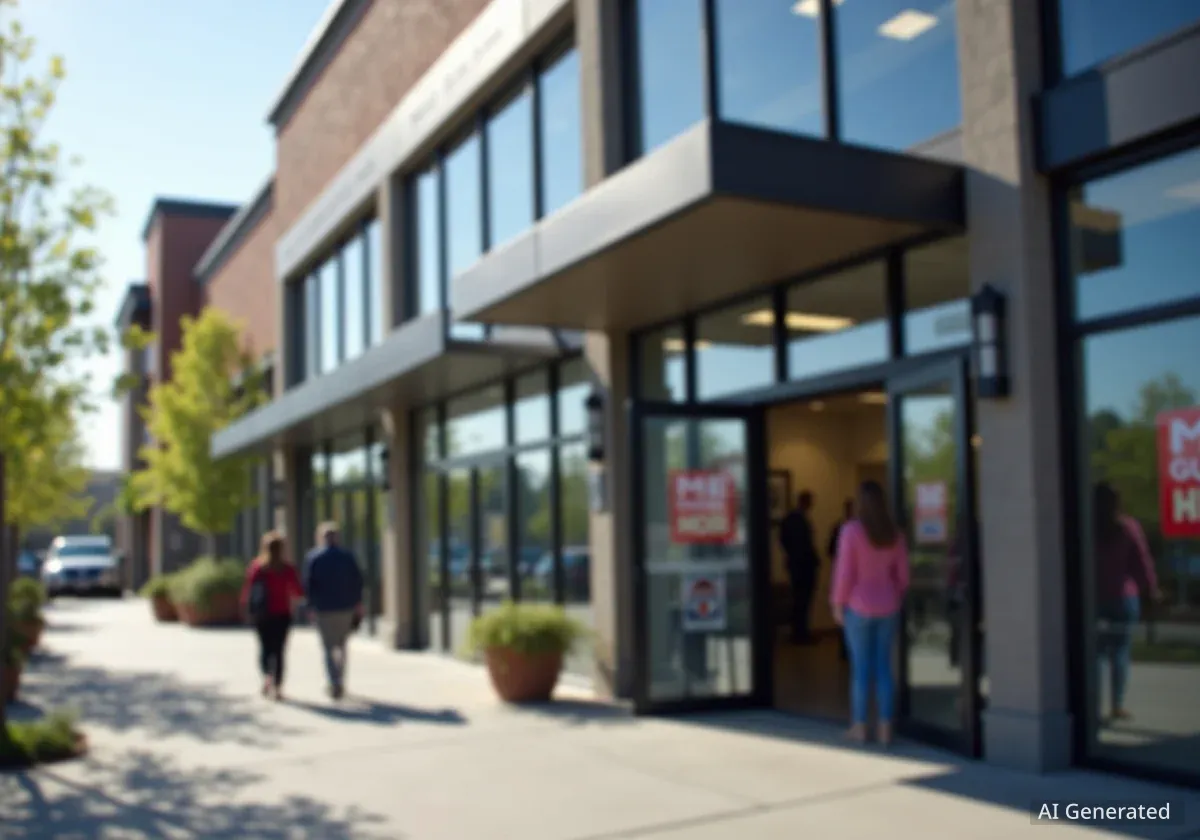A vacant Staples store in Lynnwood, Washington, has been repurposed for healthcare use following a transaction involving the nonprofit Centurion Foundation and MultiCare Health System. The deal, which took place approximately three years ago, highlights a growing trend in commercial real estate where former retail spaces are converted to meet community needs, particularly in the medical sector.
The property, located at 3011 196th St. S.E., was acquired by the Centurion Foundation. Following the acquisition, a plan was established to lease the facility to MultiCare Health System, a prominent healthcare provider in the region. This adaptive reuse project provides a new purpose for a large retail building left empty by shifts in the consumer market.
Key Takeaways
- A former Staples retail location in Lynnwood is now utilized by MultiCare Health System.
- The property was acquired by the Centurion Foundation, a nonprofit organization.
- The arrangement involves a lease agreement between the Centurion Foundation and MultiCare.
- This project is an example of adaptive reuse, converting vacant commercial space for healthcare services.
Details of the Lynnwood Property Transaction
The transformation of the Lynnwood property began when the former Staples store became available. The site, situated in a high-traffic commercial area, presented an opportunity for redevelopment. The Centurion Foundation, a nonprofit entity that facilitates real estate transactions for other organizations, stepped in to acquire the property.
Under the terms of the arrangement, the Centurion Foundation holds the property and leases it to MultiCare Health System. This structure allows the healthcare provider to expand its services without the upfront capital expenditure of purchasing the real estate directly. Such lease-back agreements are a common strategy used by nonprofits and healthcare systems to manage assets and focus resources on their core missions.
An interesting aspect of this deal is that the building and the land it sits on have separate ownership, a detail that can add complexity to commercial real estate transactions but is not uncommon. This requires separate agreements and negotiations for both the physical structure and the underlying ground.
The Growing Trend of Adaptive Reuse for Healthcare
The conversion of the Lynnwood Staples is part of a larger national trend known as adaptive reuse, where obsolete buildings are repurposed for new functions. The decline of traditional brick-and-mortar retail, accelerated by the growth of e-commerce, has left many large-format stores vacant across the country. These empty spaces, often referred to as "big-box" stores, are increasingly being transformed into facilities for other industries.
What is Adaptive Reuse?
Adaptive reuse is the process of reusing an existing building for a purpose other than which it was originally built or designed for. It is a sustainable approach that helps preserve resources, reduce urban sprawl, and revitalize communities by giving vacant properties a new life. Common examples include converting old factories into apartments or turning retail stores into medical clinics.
Healthcare has emerged as a leading sector in adaptive reuse projects. The demand for accessible, community-based medical services like urgent care centers, outpatient surgery facilities, and specialty clinics is rising. Former retail locations are often ideal for these purposes for several key reasons.
Advantages of Retail Sites for Medical Use
Converting retail properties into medical facilities offers significant benefits that make them attractive to healthcare providers. These advantages often streamline the development process and improve patient access.
- Strategic Locations: Retail centers are typically located in high-visibility areas with easy access to major roads and residential neighborhoods.
- Ample Parking: Big-box stores come with large parking lots, a crucial feature for medical facilities that serve a high volume of patients.
- Flexible Infrastructure: The open, single-story layouts of most retail stores provide a blank canvas for custom medical build-outs, accommodating everything from exam rooms to diagnostic imaging equipment.
- Community Integration: Placing medical services in familiar neighborhood shopping centers makes healthcare more convenient and accessible for local residents.
The Role of Nonprofit Facilitators in Real Estate
Organizations like the Centurion Foundation play a specialized role in the real estate market. As a nonprofit, its mission often involves acquiring and managing properties to support the work of other tax-exempt organizations, such as hospitals, schools, and community service providers.
By acting as an intermediary, the Centurion Foundation can handle the complexities of a real estate transaction, allowing an organization like MultiCare to focus on its primary goal of providing patient care. This model can also offer financial advantages, including potential property tax exemptions and access to specialized financing mechanisms available to nonprofits.
"Nonprofit partnerships in real estate can unlock significant value for community-focused organizations, enabling them to expand their services and footprint in a financially sustainable way."
This strategic approach helps healthcare systems like MultiCare expand their network of clinics and services more efficiently. It allows them to be more agile in responding to the healthcare needs of a growing community like Lynnwood without being burdened by the long-term responsibilities of property ownership.
Impact on the Lynnwood Community
The repurposing of the former Staples store brings several positive impacts to the Lynnwood area. Firstly, it prevents a large commercial property from remaining vacant long-term, which can lead to blight and negatively affect surrounding businesses. A thriving medical facility contributes to the economic vitality of the commercial district.
Secondly, it increases local access to healthcare services. By establishing a presence in a convenient retail corridor, MultiCare makes it easier for residents to receive medical attention close to home. This is particularly important for outpatient services that require frequent visits.
Finally, the project serves as a model for future development in the region. As the landscape of retail continues to evolve, communities will need innovative solutions for vacant commercial spaces. The partnership between the Centurion Foundation and MultiCare Health System in Lynnwood demonstrates a successful strategy for turning a commercial vacancy into a valuable community asset.





